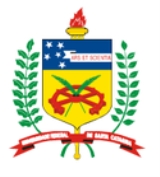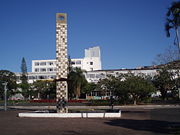
Universidade Federal de Santa Catarina
Encyclopedia

Florianópolis
-Climate:Florianópolis experiences a warm humid subtropical climate, falling just short of a true tropical climate. The seasons of the year are distinct, with a well-defined summer and winter, and characteristic weather for autumn and spring. Frost is infrequent, but occurs occasionally in the winter...
, the capital city of Santa Catarina in southern Brazil
Brazil
Brazil , officially the Federative Republic of Brazil , is the largest country in South America. It is the world's fifth largest country, both by geographical area and by population with over 192 million people...
.
Ranked as the 4th best overall university in Latin America by the Webometrics Ranking of World Universities
Webometrics Ranking of World Universities
The Webometrics Ranking of World Universities, also known as Ranking Web of World Universities, is ranking system for the world's universities based on a composite indicator that takes into account both the volume of the Web contents and the visibility and impact of these web publications...
, it is one of the leading Latin-American research universities, being the third largest university in Brazil and the fifth in Latin America, noted for its engineering school, and the only Federal University in the state of Santa Catarina.
UFSC is internationally known for the quality of its courses in mechanical engineering
Mechanical engineering
Mechanical engineering is a discipline of engineering that applies the principles of physics and materials science for analysis, design, manufacturing, and maintenance of mechanical systems. It is the branch of engineering that involves the production and usage of heat and mechanical power for the...
, control engineering
Control engineering
Control engineering or Control systems engineering is the engineering discipline that applies control theory to design systems with predictable behaviors...
, Sanitary engineering
Sanitary engineering
Sanitary engineering is the application of engineering methods to improve sanitation of human communities, primarily by providing the removal and disposal of human waste, and in addition to the supply of safe potable water. Initially in the mid 19th century, the discipline concentrated on the...
, electrical engineering
Electrical engineering
Electrical engineering is a field of engineering that generally deals with the study and application of electricity, electronics and electromagnetism. The field first became an identifiable occupation in the late nineteenth century after commercialization of the electric telegraph and electrical...
and dentistry
Dentistry
Dentistry is the branch of medicine that is involved in the study, diagnosis, prevention, and treatment of diseases, disorders and conditions of the oral cavity, maxillofacial area and the adjacent and associated structures and their impact on the human body. Dentistry is widely considered...
.
The organization of its campus is done in the 11 Centers of Education (in Portuguese: Centros de Ensino ), divided by field of study. Every Center of Education is divided in departments
Academic department
An academic department is a division of a university or school faculty devoted to a particular academic discipline. This article covers United States usage at the university level....
the largest one being Department of Mechanical Engineering comprising two undergraduate courses, Mechanical Engineering
Mechanical engineering
Mechanical engineering is a discipline of engineering that applies the principles of physics and materials science for analysis, design, manufacturing, and maintenance of mechanical systems. It is the branch of engineering that involves the production and usage of heat and mechanical power for the...
and Materials Engineering, and 10 graduation courses, 7 in Mechanical Engineering and 3 in Materials Engineering. The oldest is the Center of Juridic Sciences, that is itself the department of Law, which was the first of UFSC's departments to be officially recognized in 1932.
History
The history of Federal University of Santa Catarina has its roots in the Polytechnic Institute of Florianópolis founded on March 13 of 1917 by José Arthur Boiteux. Organized as a free institute, it was the first college degree institution of Santa Catarina state. On February 11, 1932 the Law School was incorporated, officially in 1935.That triggered a movement to start the first state university and on December 18 of 1960 it became the University of Santa Catarina, offering the courses of Law, Medicine, Pharmacy, Philosophy, Economics, Social Service and the School of Industrial Engineering. On July 15, 1968, as an effort of Brazilian government to improve college education in Brazil with education reform, the major universities in Brazil were reorganized in Centers and Departments and acquired a new education structure, more resembling the American and English methodology. Since then the university became the Federal University of Santa Catarina.
In 1961 the institution has earned a new place in the city to build its structure, located in the region of Trindade near downtown Florianópolis
Florianópolis
-Climate:Florianópolis experiences a warm humid subtropical climate, falling just short of a true tropical climate. The seasons of the year are distinct, with a well-defined summer and winter, and characteristic weather for autumn and spring. Frost is infrequent, but occurs occasionally in the winter...
. The area was previously occupied by a model farm called Assis-Brasil and is located near the coast, having several streams crossing the actual campus. The moving was finished in 1980.
A young university, the Federal University of Santa Catarina continues to grow. It has several new buildings being built on its campus, almost all of them being financed from research and projects of the laboratories, which are themselves being expanded, the latest completed being the Center of Thermophysics proprieties and the Block A3, which has several laboratories of the Department of Mechanical Engineering. At the moment, there are two additional buildings under construction, related to the Department of Informatics and Statistics and to the Department of Automation and Systems.
Admissions
The Universidade Federal de Santa Catarina undergraduate admission process is almost similar to all others in BrazilBrazil
Brazil , officially the Federative Republic of Brazil , is the largest country in South America. It is the world's fifth largest country, both by geographical area and by population with over 192 million people...
, using written tests called vestibular
Vestibular
The Vestibular is a competitive examination and is the primary and widespread system used by Brazilian universities to select their students. The Vestibular usually takes place from November to January, right before the start of school year in February or March, although certain universities hold...
. In late years this process of admission has been criticized and altered. In the 2007 the institution approved the quota system proposed by the Ministry of Education in early Luis Inácio Lula da Silva government, which makes 10% of places for incoming students available to racial minorities and 20% for students coming from public schools.
In the last three years the highest admission grades were to the following courses:
- Mechanical engineeringMechanical engineeringMechanical engineering is a discipline of engineering that applies the principles of physics and materials science for analysis, design, manufacturing, and maintenance of mechanical systems. It is the branch of engineering that involves the production and usage of heat and mechanical power for the...
: 88.87 of 96 points possibles - MedicineMedicineMedicine is the science and art of healing. It encompasses a variety of health care practices evolved to maintain and restore health by the prevention and treatment of illness....
: 88.47 of 96 - LawLawLaw is a system of rules and guidelines which are enforced through social institutions to govern behavior, wherever possible. It shapes politics, economics and society in numerous ways and serves as a social mediator of relations between people. Contract law regulates everything from buying a bus...
84.12 of 96 - Control engineeringControl engineeringControl engineering or Control systems engineering is the engineering discipline that applies control theory to design systems with predictable behaviors...
: 83.76 of 96
The admission process for grad school is more complex and usually involves a test and a recommendation from the previous college. People interested in graduate courses at UFSC should contact the department of the intended course directly. The Brazilian Ministry of Education, through CAPES (Coordenação de Aperfeiçoamento de Pessoal do Nível Superior, Superior Level Personnel Enhancement Coordination) evaluates graduate programs in Brazil every three years, ranking them from 1 (worst) to 7, being 6 excellence and 7 the international excellence level.
The following graduate courses at UFSC have received grades 6 or 7, as per the last CAPES evaluation:
- ChemistryChemistryChemistry is the science of matter, especially its chemical reactions, but also its composition, structure and properties. Chemistry is concerned with atoms and their interactions with other atoms, and particularly with the properties of chemical bonds....
- Mechanical engineeringMechanical engineeringMechanical engineering is a discipline of engineering that applies the principles of physics and materials science for analysis, design, manufacturing, and maintenance of mechanical systems. It is the branch of engineering that involves the production and usage of heat and mechanical power for the...
- Electrical engineeringElectrical engineeringElectrical engineering is a field of engineering that generally deals with the study and application of electricity, electronics and electromagnetism. The field first became an identifiable occupation in the late nineteenth century after commercialization of the electric telegraph and electrical...
- PharmacologyPharmacologyPharmacology is the branch of medicine and biology concerned with the study of drug action. More specifically, it is the study of the interactions that occur between a living organism and chemicals that affect normal or abnormal biochemical function...
- LawLawLaw is a system of rules and guidelines which are enforced through social institutions to govern behavior, wherever possible. It shapes politics, economics and society in numerous ways and serves as a social mediator of relations between people. Contract law regulates everything from buying a bus...
Numbers
2004 numbers, provided by the institution.- 62 undergraduate courses;
- 48 Master courses;
- 33 doctorate coursesDoctorateA doctorate is an academic degree or professional degree that in most countries refers to a class of degrees which qualify the holder to teach in a specific field, A doctorate is an academic degree or professional degree that in most countries refers to a class of degrees which qualify the holder...
; - 32,286 students (total);
- 1,552 professors;
- 2,987 auxiliary staff.
Centers of Education
- Center of Health Sciences - CCS
- Center of Sports - CDS
- Center of Education Sciences - CED
- Social and Economics Center - CSE
- Center of Technology - CTC
- Center of Communications and Expression - CCE
- Center of Juridic Sciences - CCJ
- Center of Agronomic Sciences - CCA
- Center of Biologic Sciences - CCB
- Center of Physics and Mathematics - CFM
- Center of Philosophy and human Sciences - CFH

